LiPo Batteries Hacking and refurbishing
One of the difficult parts when prototyping is to find reliable power sources. Today is still hard to find the battery size we want to use because country exporting frontiers stops these chemical packages. Here I’ll show how to refurbish dead batteries by combining cells and protection circuits to preserve battery life.
An (almost) dead Apple MacBook Pro (17″) battery fell in my hands so I decided to tear it down to see if there was something profitable. Inside I found that the battery pack was composed with 6 individual cells, paired in 3 groups.
Seems that the third group had a small voltage difference between cells so they began discharge between them. This leaded both cells to die, condemning the entire battery pack.
Here can be seen the individual cells:
As can be seen the cells doesn’t have individual protection circuits witch are important to avoid discharge below 2.7v to preserve battery life.
I also came across with a small photo-frame that I bough just for hacking fun as is really a bad piece with almost no memory, no SD card expansion, 128×128 display and bad electronics. It cost me 1.99€ and the battery was drain dead from the first moment I opened the package.
It was inflated and reading 0.26v. Obviously battery couldn’t be rescued, but I salvaged the power cutting circuit. Here is the reverse side of the protection circuit board. Notice the polarity when soldering the LiPo cell and wires:
Once I soldered the protection circuit board to the Apple battery cell I ran some charging and discharging tests to ensure the assembly works fine and that power is cut at 2.7v:


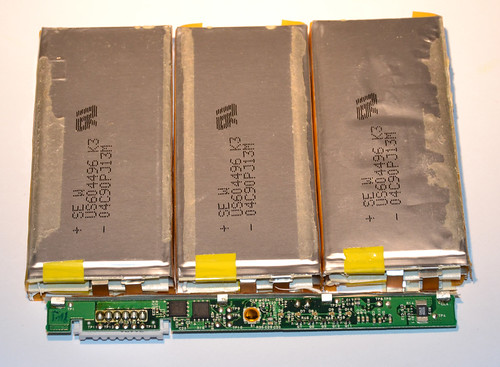
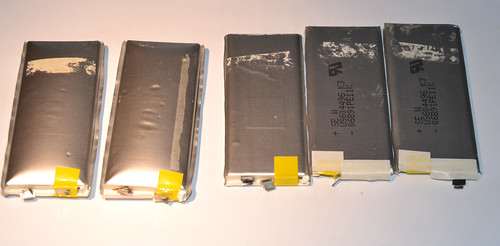
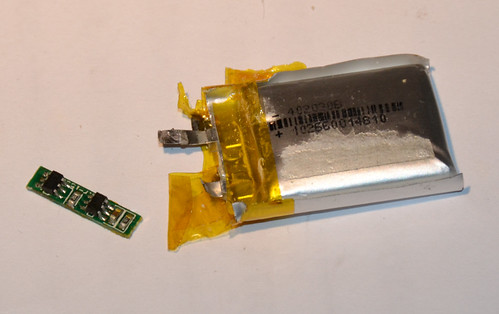
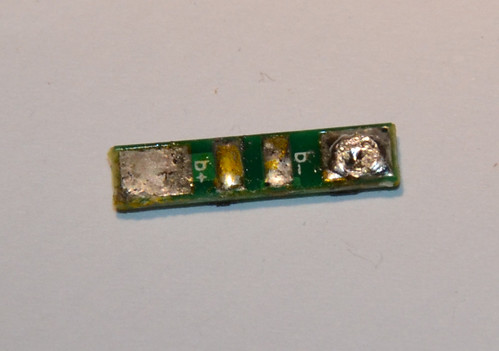
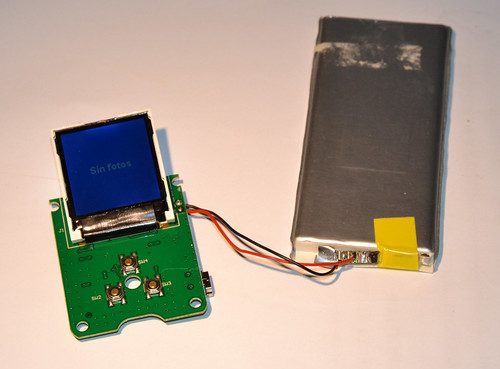
Martes, Julio 2nd 2013 at 7:07 pm
[...] let them get below a certain voltage threshold during discharge. We enjoyed reading about [Carlos'] Lithium cell salvage efforts as it discusses these [...]
Martes, Julio 2nd 2013 at 7:20 pm
[...] let them get below a certain voltage threshold during discharge. We enjoyed reading about [Carlos'] Lithium cell salvage efforts as it discusses these [...]
Miércoles, Julio 3rd 2013 at 7:58 am
Since all cells in the MacBook’s battery all seem to be from the same production batch there is of course the risk that the other cells will fail in the (near) future.
Using the salvages cells for a less current hungry application will stretch their life and is a good way of using them.
As you noticed, the 6 cell pack consists of 3 sets of 2 cells placed in parallel and that may well be the reason why one of those sets failed: a slight difference between the two parallel cells in parallel will result in a current flowing between them, damaging both cells.
It looks like you also split the parallel sets – a good thing to do, this will extend battery life.
Please note that the 2.7V is a bit low for a LiIon cell. Most protection units I have cut off at 2.8V but it is even better to stop using the batteries before this point.
Apart from preventing deep discharge, these little protection circuits will sometimes also prevent batteries from being overcharged and from over-current.
Some electronics shops sell these things – just in case you need an extra one.
Miércoles, Julio 3rd 2013 at 8:05 am
Thank you Rob!
Miércoles, Julio 3rd 2013 at 9:23 am
Muy bien Karman! otro post publicado en hackaday y muy interesante. Enhorabuena! A ver cuando volvemos a quedar!
Miércoles, Julio 3rd 2013 at 4:56 pm
[...] let them get below a certain voltage threshold during discharge. We enjoyed reading about [Carlos'] Lithium cell salvage efforts as it discusses these [...]
Sábado, Julio 6th 2013 at 12:02 pm
¡Hola Carlos! He llegado a este artículo a través de Hackaday. Me ha gustado, y todo el blog en general, felicidades. Yo hace un tiempo también abrí una bateria LiPo:
http://serkeros.wordpress.com/2012/07/18/la-lipo/
Está en catalán, supongo que lo entenderás, y si no, Google translate.
Un saludo de un colega al que también le gusta trastear y abrir cacharros.
Lunes, Septiembre 9th 2013 at 3:37 pm
[...] let them get below a certain voltage threshold during discharge. We enjoyed reading about [Carlos'] Lithium cell salvage efforts as it discusses these [...]